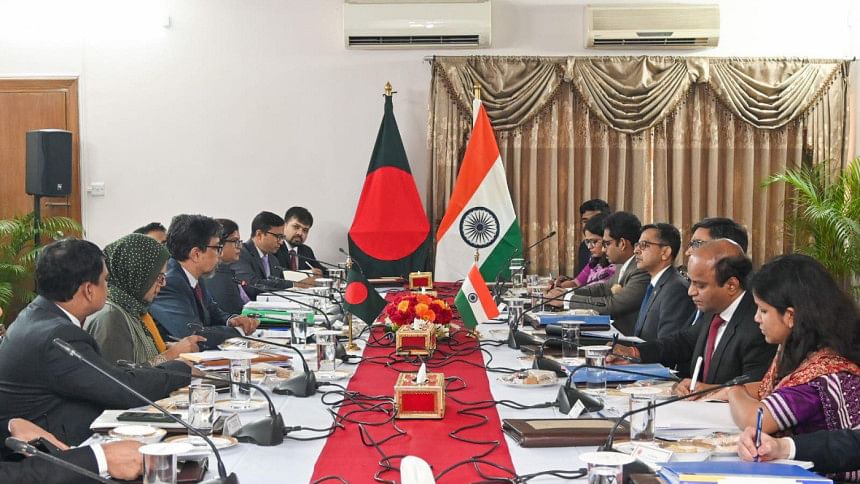
Indian Foreign Secretary Vikram Misri’s visit to Dhaka and his meetings with top officials have created a new scope to rebuild the two countries’ relations, which have seen strains since the political changeover on August 5, foreign policy analysts said.
The free, frank and candid discussions, in which both sides were able to speak their minds, were imperative to clear the smoke and start afresh, they said.
During his one-day visit on Monday, Vikram Misri called on Chief Adviser Prof Muhammad Yunus and Foreign Adviser Touhid Hossain, and held the annual Foreign Office Consultation (FOC), which covers all aspects of bilateral relations.
It was the first high-level official talk after the ouster of Awami League regime and Sheikh Hasina taking shelter in India, which is known as strong supporter of the former Bangladesh prime minister for her secular policy and guaranteeing India’s security concerns.
Alleged repression against minorities post-August 5 and Hindu priest Chinmoy Krishna Das Brahmachari’s arrest in Bangladesh triggered demonstrations in various parts of India. Meanwhile, attacks on the Bangladesh mission in Agartala and the desecration of the Bangladesh flag in Kolkata sparked widespread demonstration in Bangladesh.
Additionally, Dhaka accused the Indian media spreading false propaganda against Bangladesh and the July uprising. Bangladesh foreign ministry also summoned Indian High Commissioner Pranay Verma last week in this regard.
“Amid all these, the FOC brought diplomacy back on track. This is a good start for building mutual trust,” said Dr Imtiaz Ahmed, former professor of international relations at Dhaka University.
India and Bangladesh issued separate statements after the meetings, committing to take forward the relationship based on mutual interests.
Bangladesh’s major points include asking India to tell Sheikh Hasina not to make statements, taking steps to stop false media propaganda against Bangladesh, putting an end to border killings, and resolving the unsettled issues in the bilateral relationship, including water sharing of Teesta and other rivers.
Dhaka also requested Delhi to ensure the safety of Bangladesh missions in India.
Meanwhile, India expressed concerns over the attacks on minorities and cultural and diplomatic properties.
Indian Foreign Secretary Vikram Misri in his statement highlighted India’s support for a democratic, stable, peaceful, progressive and inclusive Bangladesh.
Prof Imtiaz, also executive director of Centre for Alternatives, said he thinks India has also spoken of elections in which all political parties of Bangladesh can take part and the views of people of all ethnicities and faiths are allowed.
Former ambassador to China Munshi Faiz Ahmad said it is good that India spoke about a democratic and inclusive Bangladesh. “In fact, that is why there was an uprising that ousted the Awami League government.”
Prof Imtiaz Ahmed said he thinks India will continue to raise the minorities issue unless there is tangible progress.
“While we said most of the incidents are political or personal in nature and not communal, we need to ensure accountability of those responsible for any attacks on minorities. That will give us leverage.”
Munshi Faiz said, “Minority repression is a human rights issue. So, anybody can speak about it. Bangladesh can also talk about the minority repression in India.
“The vital point here is that we must all ensure the protection of minorities.”
As false propaganda was a major issue in the talks, Indian foreign policy analyst Prof Sreeradha Datta said the governments of both countries should issue strong statements on the misinformation being spread by media.
“Fake news and hatred through media have become real problems in our bilateral relationship. This must end,” she told this correspondent from New Delhi yesterday.
She appreciated the way the FOC was held, saying that both sides spoke all of their issues including water sharing, connectivity, visa and consular services, trade and border killings.
Datta, who teaches international affairs at the OP Jindal Global University, said the two countries should do their parts.
Prof Imtiaz said there is a perception that India gains more from the agreements or MoUs with Bangladesh.
“I think it’s time the Bangladesh government seriously assesses the deals with India. This will also clear any confusion that may be there.”
He said the signing of the Teesta deal is unlikely. “Therefore, Bangladesh needs to think pragmatically on how to manage the river and ensure it has water during the dry season.”
Prof Imtiaz also suggested robust engagement between the people of the two countries to better understand the issues of minority repression, fake news or anti-India or anti-Bangladesh stances among them.
Munshi Faiz said the tension in the relationship only hurts the people.
“I would suggest the interim government takes steps to ensure that the political parties do not make any provocative statements that cause tension. The same also should be applied for Indian authorities.”
The government can also brief the media from time to time on the developments of the bilateral relations to the media, he said.
Sreeradha Datta said diplomacy is back on track and any issues in the bilateral relations should be resolved amicably. “Both sides need to be sincere.”
Daily star









